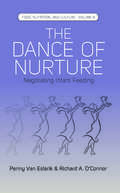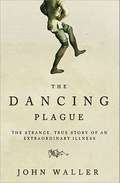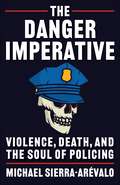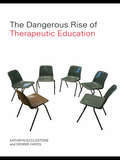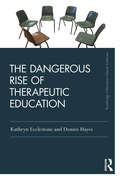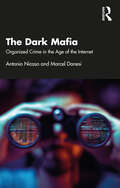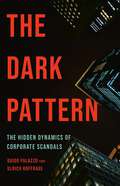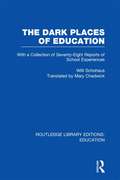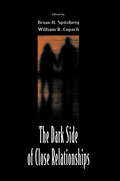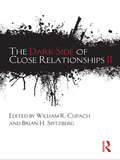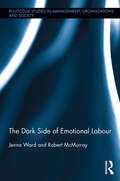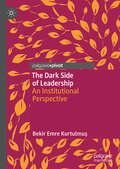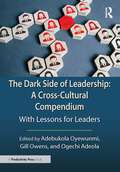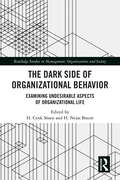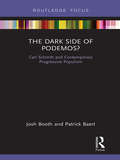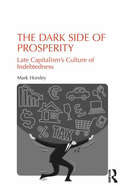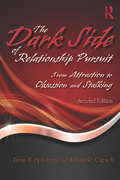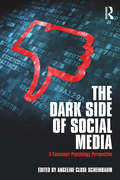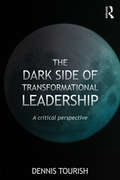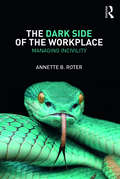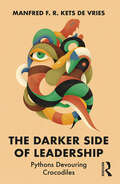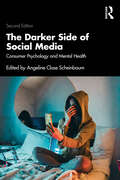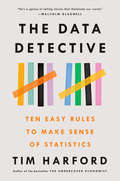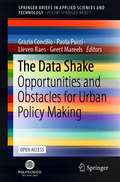- Table View
- List View
The Dance of Nurture: Negotiating Infant Feeding (Food, Nutrition, and Culture #6)
by Penny Van Esterik Richard A. O'ConnorBreastfeeding and child feeding at the center of nurturing practices, yet the work of nurture has escaped the scrutiny of medical and social scientists. Anthropology offers a powerful biocultural approach that examines how custom and culture interact to support nurturing practices. Our framework shows how the unique constitutions of mothers and infants regulate each other. The Dance of Nurture integrates ethnography, biology and the political economy of infant feeding into a holistic framework guided by the metaphor of dance. It includes a critique of efforts to improve infant feeding practices globally by UN agencies and advocacy groups concerned with solving global nutrition and health problems.
The Dancing Plague
by John WallerA gripping tale of one of history's most bizarre events, and what it reveals about the strange possibilities of human nature In the searing July heat of 1518, Frau Troffea stepped into the streets of Strasbourg and began to dance. Bathed in sweat, she continued to dance. Overcome with exhaustion, she stopped, and then resumed her solitary jig a few hours later. Over the next two months, roughly four hundred people succumbed to the same agonizing compulsion. At its peak, the epidemic claimed the lives of fifteen men, women, and children a day. Possibly 100 people danced to their deaths in one of the most bizarre and terrifying plagues in history. John Waller compellingly evokes the sights, sounds, and aromas; the diseases and hardships; the fervent supernaturalism and the desperate hedonism of the late medieval world. Based on new evidence, he explains why the plague occurred and how it came to an end. In doing so, he sheds light on the strangest capabilities of the human mind and on our own susceptibility to mass hysteria.
The Danger Imperative: Violence, Death, and the Soul of Policing
by Michael Sierra-ArévaloPolicing is violent. And its violence is not distributed equally: stark racial disparities persist despite decades of efforts to address them. Amid public outcry and an ongoing crisis of police legitimacy, there is pressing need to understand not only how police perceive and use violence but also why.With unprecedented access to three police departments and drawing on more than 100 interviews and 1,000 hours on patrol, The Danger Imperative provides vital insight into how police culture shapes officers’ perception and practice of violence. From the front seat of a patrol car, it shows how the institution of policing reinforces a cultural preoccupation with violence through academy training, departmental routines, powerful symbols, and officers’ street-level behavior.This violence-centric culture makes no explicit mention of race, relying on the colorblind language of “threat” and “officer safety.” Nonetheless, existing patterns of systemic disadvantage funnel police hyperfocused on survival into poor minority neighborhoods. Without requiring individual bigotry, this combination of social structure, culture, and behavior perpetuates enduring inequalities in police violence.A trailblazing, on-the-ground account of modern policing, this book shows that violence is the logical consequence of an institutional culture that privileges officer survival over public safety.
The Dangerous Rise of Therapeutic Education
by Dennis Hayes Kathryn EcclestoneThe silent ascendancy of a therapeutic ethos across the education system and into the workplace demands a book that serves as a wake up call to everyone. Kathryn Ecclestone and Dennis Hayes' controversial and compelling book uses a wealth of examples across the education system, from primary schools to university, and the workplace to show how therapeutic education is turning children, young people and adults into anxious and self-preoccupied individuals rather than aspiring, optimistic and resilient learners who want to know everything about the world. The chapters address a variety of thought-provoking themes, including how therapeutic ideas from popular culture dominate social thought and social policies and offer a diminished view of human potential how schools undermine parental confidence and authority by fostering dependence and compulsory participation in therapeutic activities based on disclosing emotions to others how higher education has adopted therapeutic forms of teacher training because many academics have lost faith in the pursuit of knowledge how such developments are propelled by a deluge of political initiatives in areas such as emotional literacy, emotional well-being and the 'soft outcomes' of learning The Dangerous Rise of Therapeutic Education is eye-opening reading for every teacher, student teacher and parent who retains any belief in the power of knowledge to transform people's lives. Its insistent call for a serious public debate about the emotional state of education should also be at the forefront of the minds of every agent of change in society... from parent to policy maker.
The Dangerous Rise of Therapeutic Education
by Dennis Hayes Kathryn EcclestoneThe Dangerous Rise of Therapeutic Education confronts the silent ascendancy of a therapeutic ethos across the educational system and into the workplace. Controversial and compelling, Kathryn Ecclestone and Dennis Hayes’ classic text uses a wealth of examples across the education system, from primary schools to university and the workplace, to show how therapeutic education is turning children, young people and adults into anxious and self-preoccupied individuals rather than aspiring, optimistic and resilient learners who want to know everything about the world. Remaining extremely topical, the chapters illuminate the powerful effects of therapeutic education, including: How therapeutic learning is taking shape, now and in the future How therapeutic ideas from popular culture have come to govern social thought and policies How the fostering of dependence and compulsory participation in therapeutic activities that encourage the disclosing of emotions, can undermine parents’ and teachers’ confidence and authority How therapeutic forms of teacher training undermine faith in the pursuit of knowledge How political initiatives in emotional literacy, emotional wellbeing and ‘positive mental health’ propagate a diminished view of human potential throughout the education system and the workplace. The Dangerous Rise of Therapeutic Education is an eye-opening read for every teacher and leader across the field of education, and every parent and student, who is passionate about the power of knowledge to transform people’s lives. It is a call for a debate about the growing impact of therapeutic education and what it means for learning now and in the future.
The Dark Mafia: Organized Crime in the Age of the Internet
by Marcel Danesi Antonio NicasoThis book explores how organized crime has adapted and evolved in sync with ever-expanding technologies to update its popular image and to conduct its covert operations. It shows how organized crime operates in dark virtual spaces and how it can now form a dynamic interactive system with legitimate online spaces, solidifying its criminal exploits and resources, and making them attractive to a new generation of computer users. Focusing on Italian Mafias, Russian and Georgian criminal groups and drug cartels, and Asian crime syndicates such as Yakuza and Triads, this book aims to describe and explain the reasons behind the continuity of online and offline crime, taking into consideration whether or not internet culture has radically changed the way we perceive organized crime and if so how, and thus how the shift in popular imagery that the internet has brought about affects its actual illegal activities. We also consider how organized crime has shifted its locale from the physical to the virtual, how cybercrime has allowed criminal organizations to adapt and reinvent themselves, and how the police now use technology against organized crime. To better understand the new generation of criminals, it is becoming increasingly urgent to understand the latest technologies and how criminals utilize them. The Dark Mafia is an engaging and accessible introduction to understanding virtual organized crime. It will appeal to students and scholars of criminology, sociology, policing, and all those interested in the digital age of organized crime.
The Dark Pattern: The Hidden Dynamics of Corporate Scandals
by Ulrich Hoffrage Guido PalazzoFrom the creators of the theory of ethical blindness comes an investigation into how corporate scandals happen, revealing the common pattern behind them and how your organization can avoid them Too often, the stories of corporate scandals are narrated like Hollywood movies in which once-celebrated CEOs are unmasked as sociopaths and ultimately convicted for their crimes. What we fail to realize, however, is that most bad things are done by average people with honorable values and without bad intentions. In The Dark Pattern, two experts in business ethics and decision-making challenge the conventional view that corporate misconduct happens because of a handful of bad actors. Instead, the book shows how entire organizations can fall off the moral cliff because good people become ethically blind. Drawing on the latest insights from behavioral science, the authors identify nine toxic elements that lead to corporate scandals and offer nine actionable lessons for building morally resilient organizations. Essential reading for business leaders, The Dark Pattern offers real-world guidance for defending companies against the subtle dynamics of moral erosion.
The Dark Places of Education: With a Collection of Seventy-Eight Reports of School Experiences (Routledge Library Editions: Education)
by Willi SchohausThe book is divided into two parts. The first forms a survey of the inadequacies of the Swiss school system in the early twentieth century (but the issues it discusses were universal ones which were just as prevalent in the English school system of that time). The second part of the book is a collection of testimonies from former pupils on the worst aspects of their schooling. With reference to the ideals of Pestalozzi the author proposes ways in which to find constructive solutions to the problems of harsh teachers, schools and de-motivated pupils.
The Dark Side of Close Relationships
by William R. Cupach Brain H. SpitzbergThis collection of essays represents a follow-up to the editors' 1994 publication, The Dark Side of Interpersonal Communication. In the preface to that collection of essays, they argued that "To fully understand how people function effectively requires us to consider how individuals cope with social interaction that is difficult, problematic, challenging, distressing, and disruptive." In this companion volume, the focus expands from social interaction to close relationships. Aside from the inherent need to investigate the bad as well as the good of interpersonal relationships, the editors and their colleagues simply find the dark side metaphor to be intellectually arousing. It stimulates investigation of important yet often neglected phenomena, and it especially encourages consideration of the hidden and forbidden, and the paradoxical and ironic elements of human relating. This volume assembles the cutting-edge work of first rate scholars from the ranks of communication, psychology, sociology, and cognate disciplines. As in the previous text, the subject matter and stylistic approaches are diverse, reflecting the broad and interdisciplinary domain that is the dark side of human affairs. The selection of topics is somewhat selective, reflecting only a sample of emerging scholarship in the interdisciplinary study of relationships. These internationally recognized scholars examine various topics related to the dark side, including fatal attractions, jealousy and envy, misunderstanding, gossip, conflict, codependence, sexual coercion, stalking, relationship termination, unrequited love, and mental health problems in relationships. Some chapters present original data and models, whereas others reconfigure the way in which the understandings of relationships can be better understood. In addition, the bookend chapters examine the ideology, nature, and problems of dark side scholarship. Collectively, the scholarly journeys made in this volume are intended to illustrate the complexities--both moral and functional--involved in close relationship processes. The intent is neither to valorize nor demonize the darker aspects of close relationships, but rather to emphasize their importance to the day-to-day "doing" of relationships. Only by accepting such processes as integral to relationships can their role be fully understood.
The Dark Side of Close Relationships II
by William R. Cupach Brian H. SpitzbergThe Dark Side of Close Relationships II is a completely new and up-to-date version of the original volume published in 1998, featuring new topics and authors. The volume showcases cutting-edge work on important topics by prominent scholars in multiple disciplines. It sheds light on the paradoxical, dialectical, and mystifying facets of human interaction, not merely to elucidate dysfunctional relationship phenomena, but to help readers explore and understand it in relation to a broader understanding about relationships. As previous Dark Side investigations have revealed, negative or dysfunctional outcomes can occur in relationships even though positive and functional ones are expected, and at the same time, positive silver linings are often found in some dark relational clouds. Such nuanced approaches are needed to better account for the complexity of close relationships. A unique and provocative collection, this volume will appeal to relationship researchers in communication, social psychology, family studies, and sociology.
The Dark Side of Emotional Labour (Routledge Studies in Management, Organizations and Society)
by Jenna Ward Robert McMurrayThe Dark Side of Emotional Labour explores the work that the rest of society would rather not think about, the often unseen work that is emotionally disturbing, exhausting, upsetting, and stigmatising. This is work that is simultaneously undesirable and rewarding, work whose tasks are eschewed and yet necessary for the effective function of individual organisations and society at large. Diverse and challenging, this book examines how workers such as the doorman, the HR manager, the waiter and the doctor’s receptionist experience verbal aggression and intimidation; how the prison officer and home carer respond to the emotions associated with physical violence, and; how the Samaritan, banker and veterinarian deal in death and despair. It also considers how different individuals develop the emotional capital necessary to cope with the dark side of emotional labour, and how individuals can make sense of, and come to take satisfaction and pride in, such difficult work. Finally, the book considers what is to be done with darker emotional work, both in terms of the management and care of those labouring on the dark side. Challenging and original, this book gives a voice to those who undertake the most demanding work on our behalf. It will be of interest to researchers and students of organisation studies and its related fields, and to every one of us who is called on to work or manage on the Dark Side.
The Dark Side of Leadership: An Institutional Perspective
by Bekir Emre KurtulmuşContrary to the notion that leaders contribute to positive behaviour within organisations, this book reflects growing interest in the ‘dark side’ of leadership: the unethical and immoral personalities that can reside in positions of power. Drawing on empirical and theoretical analysis, the author examines immorality within leadership and the underlying causes behind this behaviour. Focusing on the impact of institutional pressures, this book analyses how such behaviour is influenced by internal and external factors. By employing a theoretical framework, the author seeks to demonstrate that institutions either compel leaders to be ethical and moral, or in contrast, they actually provide legitimacy for immoral actions. An insightful and thought-provoking read, The Dark Side of Leadership will be of interest to those studying leadership, HRM, and business ethics, as well as social psychology scholars.
The Dark Side of Leadership: With Lessons for Leaders
by Ogechi Adeola Adebukola Oyewunmi Gill OwensThe corporate landscape is rife with instances of leaders who have left a trail of sinister outcomes.In the last three decades, the research in leadership and organisational sciences has expanded in theoretical and typological breadth to include the dark side. These works have aimed at uncovering the complex interplay of personalities, power dynamics, and organisational cultures that can lead to destructive and unethical behaviours in the workplace. While there are volumes of literature on leadership, there is a dearth of research that integrates dark leadership and cross-cultural norms, perspectives, variances, and interventions. The Dark Side of Leadership: A Cross-Cultural Compendium is a collaborative and transdisciplinary venture that draws on the knowledge and experiences of practitioners and scholars across the globe to explore the contentious and evolving subject of dark leadership. The primary consideration of this book is to explore dark side leadership conceptualisations and manifestations across contexts and provide insights into traits, processes, and outcomes, as well as interventionist paradigms. Hofstede’s research demonstrates the fundamental role of national and organisational culture in shaping leadership behaviour. This book comprehensively documents cross-cultural cases, perspectives, and research on the dark side of leadership.
The Dark Side of Marketing Communications: Critical Marketing Perspectives (Routledge Studies in Critical Marketing)
by Tim Hill Pierre McDonaghWhat fuels capitalism and what stops it from collapsing? Does marketing communications support and sustain the economic and political status quo?This book is not about describing the ways in which businesses can optimize the messages they put across or about adding to the marketing communicator’s toolkit. This book argues that marketing communications plays an increasingly important role in bolstering contemporary capitalism. Drawing on conceptualizations of the ‘market’ from political economy and sociology, it focusses on five logics that underpin and sustain the form of capitalism in which we live: the logic of competition, the logic of sustainability, the logic of individualism, the logic of objectivity, and the logic of distraction. It does this by exploring those arenas which are increasingly dominated by the communicative activities of business: sport, CSR, social media, statistics, and entertainment.Bringing theories from marketing and consumer research, sociology, cultural studies, technology and media studies to bear on marketing communications, this book is necessary reading for undergraduate and postgraduate students and academics who wish to understand the broader role of marketing communications in the reproduction of contemporary capitalism.
The Dark Side of Organizational Behavior: Examining Undesirable Aspects of Organizational Life (Routledge Studies in Management, Organizations and Society)
by H. Cenk Sözen H. Nejat BasımThe Dark Side of Organizational Behavior aims to gather all the micro and meso level topics about the dark side of organizations that may guide management practitioners, researchers, and students. The history before the modern human civilization is full of multiple types of conflicts, wars, struggles and violence. Modernization project has constructed a desired reality of human being and has somehow concealed the dark side of human interactions. Through this outlook, this book explores the realities of the dark side of organizations and how these realities may have the potential to change previous assumptions about business life. The field of Organizational Behavior is dominated by the positive aspects of the business life, but conflict, war, struggle, and violence have always been a part of history. It is not possible to isolate organizational participants from negative emotions like hostility, dislike, hate, jealousy, rage, and revenge. A manager may devote most of their time to cope with conflicts, deviant behaviors, ambitious individuals, gossips, and dysfunctional rivalry among employees. It is evident that negative events and interactions among employees cost more time and energy for a manager than the positive side of organizational life. Therefore, exploring the realities of the dark side of organizations may have the potential to change previous assumptions about business life. This book will be of interest to researchers, academics, practitioners, and advanced students in the fields of organizational studies and behavior, human resource management, employment relations, and organizational psychology.
The Dark Side of Podemos?: Carl Schmitt and Contemporary Progressive Populism (Routledge Advances in Sociology)
by Patrick Baert Josh BoothIn 2014 a new progressive party, Podemos, emerged on the Spanish political scene. Within just over two years it had become the country’s third-biggest party, winning a slew of seats in parliament and regularly making headline news. While some see Podemos as the saviour of Spanish democracy, others have accused it of corrosive populism. But what few have noticed is that behind its distinctive rhetoric lies a thinker closely associated with Germany’s Third Reich: Carl Schmitt. Why has an ostensibly progressive and avowedly anti-fascist political party taken up Schmitt’s ideas? The puzzle only deepens when we learn of Schmitt’s links with Francisco Franco’s dictatorship. In The Dark Side of Podemos?, Booth and Baert explain why Schmittian theory resonated with Podemos’ founders. In doing so, the authors position Podemos and the ideas that guide it within the context of recent Spanish history and ongoing politics of memory, revealing a story about how personal and political narratives have combined to produce a formidable political force. This enlightening monograph will appeal to undergraduates and postgraduates, as well as postdoctoral researchers, interested in fields such as Politics, Political Theory and Sociology. It will also be relevant to those curious about contemporary Spanish politics, the nature of populism, the future of the European left, or Carl Schmitt and his links with Spain.
The Dark Side of Prosperity: Late Capitalism’s Culture of Indebtedness
by Mark HorsleyThis book offers a critical analysis of consumer credit markets and the growth of outstanding debt, presenting in-depth interview material to explore the phenomenon of mass indebtedness through the life trajectories of self-identified debtors struggling with the pressures of owing money. A rich and original qualitative study of the close relationship between financial capitalism, consumer aspirations, social exclusion and the proliferation of personal indebtedness, The Dark Side of Prosperity examines questions of social identity, subjectivity and consumer motivation in close connection with the socio-cultural ideals of an ’enjoyment society’ that binds the value of the lives of individuals to the endless acquisition and disposal of pecuniary resources and lifestyle symbols. Critically engaging with the work of Giddens, Beck and Bauman, this volume draws on the thought of contemporary philosophers including Zizek, Badiou and Rancière to consider the possibility that the expansion of outstanding consumer credit, despite its many consequences, may be integral to the construction of social identity in a radically indeterminate and increasingly divided society. A ground-breaking work of critical social research this book will appeal to scholars of social theory, contemporary philosophy and political and economic sociology, as well as those with interests in consumer credit and cultures of indebtedness.
The Dark Side of Relationship Pursuit: From Attraction to Obsession and Stalking
by William R. Cupach Brian H. SpitzbergAwards and Praise for the first edition: Recipient of the 2006 International Association for Relationship Research (IARR) Book Award "This text, as it presently stands, is THE go-to text for stalking researchers. That is my opinion and the opinion of multiple fellow scholars I know in the field. It rarely sits on my shelf, but rather is a constant reference on my desk. I can always count on these authors to have done an extensive review of literature. I thought I was thorough, but they are always providing me with new references."--Dr. H. Colleen Sinclair, Associate Professor of Psychology, Mississippi State University "Cupach and Spitzberg provide the reader with a multidisciplinary framework for understanding the nature and impact of unwanted relationship pursuits. This book is an excellent resource for students and professionals alike who seek to gain knowledge about unwanted relational pursuits and stalking." —Journal of Couple & Relationship Therapy The Dark Side of Relationship Pursuit provides historical and definitional frames for studying unwanted relationship pursuit, and considers the role of the media, law, and social science research in shaping today’s conceptualizations of stalking. The volume integrates research from diverse contributing fields and disciplines, providing a thorough summary and assessment of current knowledge on stalking and obsessive pursuit. Building on the foundation of the award-winning first edition, this revision considers assessment issues, offers an expanded analysis of the meta-analysis data set, and includes coverage of intercultural and international factors. As an increasing number of scholarly disciplines and professional fields study stalking and other forms of obsessive relationship pursuit, this book is a must-have resource for examining interpersonal conflict, social and personal relationships, domestic violence, unrequited love, divorce and relational dissolution, and harassment. It also has much to offer researchers, counselors, and professionals in psychology, counseling, criminal justice, sociology, psychiatry, forensic evaluation, threat assessment, and law enforcement.
The Dark Side of Social Media: A Consumer Psychology Perspective
by Angeline Close ScheinbaumThe Dark Side of Social Media takes a consumer psychology perspective to online consumer behavior in the context of social media, focusing on concerns for consumers, organizations, and brands. Using the concepts of digital drama and digital over-engagement, established as well as emerging scholars in marketing, advertising, and communications present research on some unintended consequences of social media including body shaming, online fraud, cyberbullying, online brand protests, social media addiction, privacy, and revenge pornography. It is a must-read for scholars, practitioners, and students interested in consumer psychology, consumer behavior, social media, advertising, marketing, sociology, science and technology management, public relations, and communication.
The Dark Side of Transformational Leadership: A Critical Perspective
by Dennis TourishMost research into leadership has presented leaders as heroic, charismatic and transformational ‘visionaries’. The leader, whether in business, politics or any other field, is the most important factor in determining whether organizations succeed or fail. Indeed, despite the fundamental mistakes which have, arguably, directly led to global economic recession, it is often still taken for granted that transformational leadership is a good thing, and that leaders should have much more power than followers to decide what needs to be done. The Dark Side of Transformational Leadership confronts this orthodoxy by illustrating how such approaches can encourage narcissism, megalomania and poor decision-making on the part of leaders, at great expense to those organizations they are there to serve. Written in a lively and engaging style, the book uses a number of case studies to illustrate the perils of transformational leadership, from the Jonestown tragedy in 1978 when over 900 people were either murdered or committed suicide at the urging of their leader, to an analysis of how banking executives tried to explain away their role in the 2008 financial crisis This provocative and hugely important book offers a rare critical perspective in the field of leadership studies. Concluding with a new approach that offers an alternative to the dominant transformational model, The Dark Side of Transformational Leadership will be an invaluable text for academics interested in leadership, students on leadership courses requiring a more critical perspective, and anyone concerned with how people lead people, and the lessons we can learn.
The Dark Side of the Workplace: Managing Incivility
by Annette B. RoterThe workplace can be a hotbed of difficulty and incivility—from rumors spread about an individual, to the agonies of stress, to physical attacks and even death. Evidence suggests that not only does incivility have significant implications for employees, organizations and society, it is also on the rise. In recent years we have experienced increased acts of incivility in the workplace, social media and government positions. There is a direct correlation between uncivil behavior and financial outcomes for organizations. It is estimated that stress related to uncivil actions in the workplace costs organizations approximately $300 billion annually. The cost of personal implications for employees is often too high to calculate as individuals experience loss of reputation and significant psychological and physical distress. With the increased use of social media, individuals are experiencing incivility that crosses the boundary between their personal and professional lives. This book delves into the darker side of the workplace, discussing bullying, toxic work environments, corporate psychopaths, the struggles of stress, and more. It combines recent research and case studies to provide an understanding of these behaviors, and offers practical solutions on how to cultivate a healthy working environment.
The Darker Side of Leadership: Pythons Devouring Crocodiles
by Manfred F. Kets de VriesManfred Kets de Vries is one of the most authoritative voices on organizational dynamics, leadership, executive coaching, and psychotherapy today. In all his roles, he has noticed that questions are now, increasingly, coming back to one thing – the wider state of the world. Using an engaging and highly readable style throughout the book, Manfred helps us to make sense of the confusing and, some might say, psychotic times in which we now live.Revealing the darker side of leadership, Manfred explores the tendency for people to adopt ‘sheeple’ or herd-like behavior, the populist threat that we are facing, the dangers that come with feelings of perceived injustice, the rise of dictatorships, and the impact of Leviathan (neo-authoritarian) leadership behavior. Guided by theoretical concepts, the book provides readers with a better understanding of the underlying forces that drive these phenomena to the surface. What are the psychological dynamics at play? Why do groups of people behave in this manner? Beyond merely diagnosing what’s happening, Manfred introduces various coping strategies to counteract the emergence of these regressive forces.The book offers a unique and original approach to answering the micro- and macro-psychological questions of how to mitigate against populism and autocratic leadership, and will be of interest to the general reader as well as the key audiences of organizational leaders, psychoanalysts, coaches, psychotherapists, sociologists and social psychologists.
The Darker Side of Social Media: Consumer Psychology and Mental Health
by Angeline Close ScheinbaumThe Darker Side of Social Media: Consumer Psychology and Mental Health takes a research-based, scientific approach to examining problematic issues and outcomes that are related to social media use by consumers. Now in its second edition, it relies on psychological theories to help explain or predict problematic online behavior within the social media landscape through the lens of mental health.With an aim to provide solutions, the authors spotlight the key issues affecting consumer well-being and mental health due to the omnipresence and overuse of social media. The book dissects the unintended consequences of too much social media use, specifying key problems like disconnection anxiety, eating disorders, online fraud, cyberbullying, the dark web, addiction, depression, self-discrepancies, and serious privacy concerns (especially impacting children or young people). The book provides grapples with mental health disorders such as anxiety, depression, self-harm, and eating disorders that can be intensified by, or correlated with, too much social media use. The authors meticulously review the various facets of the darker side of online presence and propose actionable solutions for each of the problems stated, providing scholars with a conceptual model with propositions for continued research.This international exploration of social media is a must-read for students of marketing, advertising, and public relations, as well as scholars/managers of business, marketing, psychology, communication, management, and sociology. It will also be of interest to social media users, those navigating new media platforms parents, policymakers, and practitioners.
The Data Detective: Ten Easy Rules to Make Sense of Statistics
by Tim HarfordFrom &“one of the great (greatest?) contemporary popular writers on economics&” (Tyler Cowen) comes a smart, lively, and encouraging rethinking of how to use statistics.Today we think statistics are the enemy, numbers used to mislead and confuse us. That&’s a mistake, Tim Harford says in The Data Detective. We shouldn&’t be suspicious of statistics—we need to understand what they mean and how they can improve our lives: they are, at heart, human behavior seen through the prism of numbers and are often &“the only way of grasping much of what is going on around us.&” If we can toss aside our fears and learn to approach them clearly—understanding how our own preconceptions lead us astray—statistics can point to ways we can live better and work smarter.As &“perhaps the best popular economics writer in the world&” (New Statesman), Tim Harford is an expert at taking complicated ideas and untangling them for millions of readers. In The Data Detective, he uses new research in science and psychology to set out ten strategies for using statistics to erase our biases and replace them with new ideas that use virtues like patience, curiosity, and good sense to better understand ourselves and the world. As a result, The Data Detective is a big-idea book about statistics and human behavior that is fresh, unexpected, and insightful.
The Data Shake: Opportunities and Obstacles for Urban Policy Making (SpringerBriefs in Applied Sciences and Technology)
by Grazia Concilio Paola Pucci Lieven Raes Geert MareelsThis open access book represents one of the key milestones of PoliVisu, an H2020 research and innovation project funded by the European Commission under the call “Policy-development in the age of big data: data-driven policy-making, policy-modelling and policy-implementation”. It investigates the operative and organizational implications related to the use of the growing amount of available data on policy making processes, highlighting the experimental dimension of policy making that, thanks to data, proves to be more and more exploitable towards more effective and sustainable decisions. The first section of the book introduces the key questions highlighted by the PoliVisu project, which still represent operational and strategic challenges in the exploitation of data potentials in urban policy making. The second section explores how data and data visualisations can assume different roles in the different stages of a policy cycle and profoundly transform policy making.
